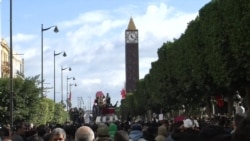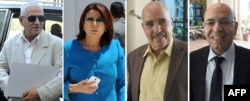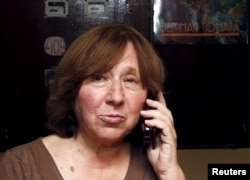Tunisia’s National Dialogue Quartet has won this year’s Nobel Peace Prize for its "decisive contribution to the building of a pluralistic democracy in Tunisia in the wake of the Jasmine Revolution of 2011."
The announcement came Friday in Oslo from Kaci Kullman Five, head of the Nobel Committee.
The quartet is made up of the Tunisian General Labor Union; the Tunisian Confederation of Industry, Trade and Handicrafts; the Tunisian Human Rights League and the Tunisian Order of Lawyers.
Kullman Five said the group started its work at a time when Tunisia’s fragile democratization was in danger of collapsing as a result of political assassinations and social unrest.
“It established an alternative peaceful political process at a time when the country was on the brink of civil war," Kullman said.
Tunisia was the site of the first of the popular uprisings known as the Arab Spring. Tunisians took to the streets and forced the departure of longtime President Zine el Abidine Ben Ali, in the hope of ending decades of autocratic rule and corruption.
By many accounts, Tunisia is the Arab Spring’s only success story.
While Egypt and Libya plunged into political turmoil and Syria descended into civil war, Tunisia carried out a nonviolent election in which voters last year handed victory to a secular political party.
But questions remain on how sustainable the gains will be as the country continues to struggle with corruption, a 35 percent unemployment rate among young people and the recruitment of thousands of young Tunisians by extremists, including the Islamic State group.
The United States this year pledged hundreds of millions of dollars in additional aid and more cooperation to bolster the fledgling democracy. During a visit by Tunisia’s president to Washington in May, President Barack Obama designated the country as a major non-NATO ally of the United States, making it possible for Tunisia to receive more military aid.
The Nobel committee on Friday said it hopes Tunisia will serve as an example for other countries.
This year’s list of 273 contenders was among the longest ever for the peace prize and included Pope Francis as well as German Chancellor Angela Merkel.
Reaction
Tunisian President Beji Caid Essebsi said the award recognizes the "path of consensus" chosen by the country after the 2011 revolution. "Tunisia has no other solution than dialogue despite ideological disagreements."
Obama called the Quartet "an inspiring reminder that lasting peace and security can only be achieved when citizens are empowered to forge their own future and that democracy is both possible and necessary."
Salil Shetty, secretary general of the human rights group Amnesty International, said the award was a "signal of hope" and "a fitting tribute to its members' work in strengthening civil society and human rights in a society still struggling with the legacy of decades of repression and abuse."
In a congratulatory message, U.N. spokesman Ahmad Fawzi said to reporters in Geneva that “we need a civil society to help us to move peace processes forward."
The European Union President Donald Tusk tweeted: "Congrats to National Dialogue Quartet for Nobel Prize. After visit to Tunisia on March I understand and respect (the) choice."
About the prize
Nobel Prizes are awarded each year in medicine, physics, chemistry, literature and peace. The money comes from a bequest by Swedish inventor Alfred Nobel. The awards, in existence since 1901, have become a top achievement honor in each field.
The Nobel Memorial Prize in Economic Sciences is also awarded by the committee, although it is not one of the original prizes set up by Alfred Nobel. It will be announced Monday, the last of the several prizes.
Nobel Prize winners are awarded a monetary prize that varies slightly in amount from year to year; in 2015, it is about $975,000. They are also given a medal and a Nobel diploma, awarded at ceremonies in Oslo and in Stockholm in December.
Multiple winners divide the prize equally among themselves.
Last year, the Peace Prize was awarded to India's Kailash Satyarthi and Pakistan's Malala Yousafzai.
Literature
On Thursday, the Nobel Prize in Literature was awarded to Belarusian journalist Svetlana Alexievich for what the Nobel Committee called "her polyphonic writings, a monument to suffering and courage in our time."
Alexievich has written books on the human impact of the Chernobyl disaster, the 10-year Soviet-Afghanistan war, and Soviet and post-Soviet history. Her work relies heavily on oral history and first-person perspective.
Her works include 1985's The Unwomanly Face of War, a novel made up of monologues of some 200 women who served in World War II; Voices from Chernobyl, an oral history, consisting of some 500 interviews on the 1986 nuclear power plant disaster in Ukraine; and Zinky Boys, a firsthand account of the Soviet-Afghan war.
Chemistry
Wednesday, the Nobel Prize in Chemistry went to three scientists for their work on human DNA repair, which can be used in treatment of cancer.
The laureates were Tomas Lindahl, a Swede based at Britain's Francis Crick Institute; American Paul Modrich of Duke University in Durham, North Carolina; and Aziz Sancar, a Turkish-American based at the University of North Carolina at Chapel Hill.
Physics, medicine
On Tuesday, the 2015 Nobel physics prize was awarded to Takaaki Kajita of Japan and Arthur MacDonald of Canada for their discovery of neutrino oscillations, which show that neutrinos — the second-most abundant particles in the universe, next to photons — have mass and change identities.
On Monday, the Nobel committee announced the prize winners for medicine: William Campbell of Ireland, Satoshi Omura of Japan and China's Tu Youyou share the prize. Campbell and Omura discovered a new therapy for infections caused by roundworm parasites. Tu discovered a drug that has significantly reduced the mortality rates for patients suffering from malaria.








